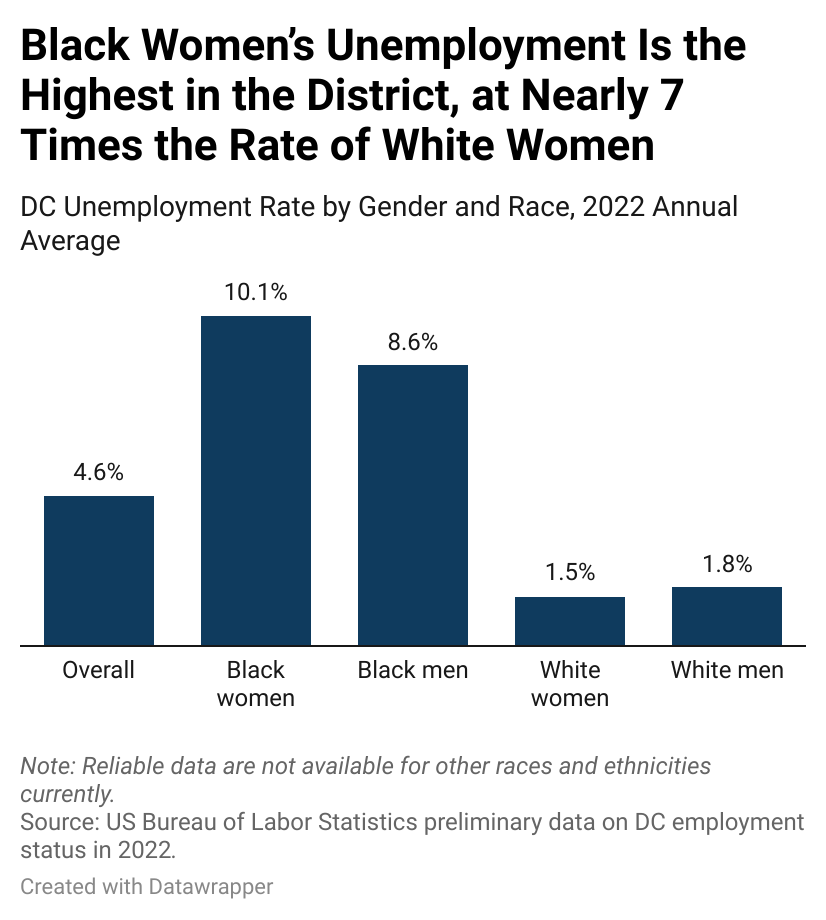![]()
![]()
 On Mother’s Day, families across the District will celebrate moms, parents, and caregivers. When they give preliminary approval to the fiscal year (FY) 2024 budget on May 16th, the DC Council can make critical investments that support Black and brown mothers and families facing intersecting oppressions. The Council should restore cash relief to excluded workers, fully fund rental assistance, and invest in housing supports for families experiencing chronic homelessness. Doing so will advance racial, gender, and economic justice.
On Mother’s Day, families across the District will celebrate moms, parents, and caregivers. When they give preliminary approval to the fiscal year (FY) 2024 budget on May 16th, the DC Council can make critical investments that support Black and brown mothers and families facing intersecting oppressions. The Council should restore cash relief to excluded workers, fully fund rental assistance, and invest in housing supports for families experiencing chronic homelessness. Doing so will advance racial, gender, and economic justice.
Black and Brown Moms Experience Systemic Barriers to Economic Stability and Prosperity
Most families need mothers’ wages to make ends meet. In the District, more than half of moms were the primary breadwinners before the pandemic. Women of color, especially Black women, always have been more likely to work outside of their homes than their white counterparts, due to deeply entrenched racism and sexism. The US has a long history of systemic racial and gender oppression and exploitation in the labor market, including stolen labor and exclusion from worker protection laws. These historic harms continue to suppress Black women’s income: for example, it takes 22 months for Black women in the District to earn what DC’s white men make in a year, according to US Census data.

Women of color are overrepresented in low-paid jobs that do not provide stable schedules or health care coverage, and they were also hardest hit by the COVID-19 recession, experiencing disproportionately high levels of unemployment and hardship. In 2022, on average, Black women in DC experienced the highest rate of unemployment (10.1 percent), compared to other demographics for which data is available, including Black men (Figure 1).
Inclusive policies adopted over the last decade such as paid leave, mandated sick days, free universal pre-kindergarten, and ending time limits for Temporary Assistance for Needy Families (TANF, or welfare) cash assistance have pushed back on structural inequities. Yet, DC lawmakers must continue to act in to achieve gender and racial economic justice.
The Council Is Making Investments in Black and Brown Moms, But There’s More to Be Done
Council budget committees already have made strong investments in Black and brown mothers in the FY 2024 budget proposal. Their budget keeps the Mayor’s proposals to expand both child care affordability to more moderate-income families and a direct cash assistance program supporting moms in Wards 5, 7, and 8. The Council budget also restores funding to the baby bonds program and funds implementation of a law extending protections and rights to over 9,000 domestic workers. These investments will improve economic security and well-being for Black and brown women and their families and reduce the racial wealth gap.
As the FY 2024 budget seasons wraps up, the Council can build on these investments by:
- Restoring cash relief for workers excluded from unemployment and other assistance. The District is home to about 15,000 workers who are excluded from unemployment assistance. Last year, these workers won $20 million for direct cash assistance—yet the Mayor swiped this funding in her FY 2023 Supplemental Budget. In a recent rally at the Wilson Building, excluded workers—including moms with their children in tow—told lawmakers they use this cash assistance to pay for the basics for their families.
- Allocating at least $102.5 million more to the Emergency Rental Assistance Program (ERAP). The Mayor’s FY 2024 proposed budget cut ERAP by 80 percent. ERAP assists residents with low incomes avoid eviction. The Council only has restored $6.3 million to ERAP, and failure to fully fund ERAP puts renters with low incomes at risk of losing housing. Black and Hispanic renters, particularly women, are disproportionately evicted from their homes, putting moms of color at risk of job loss, depression, and poverty.
- Funding 480 Permanent Supportive Housing (PSH) vouchers for families experiencing chronic homelessness. DC has one of the highest rates of homelessness in the US, and the most recent data show that nearly 94 percent of families experiencing homelessness identify as Black. Women make up 83 percent of adults in families experiencing homelessness—yet the budget includes funding for zero new vouchers. PSH vouchers for families will help ensure that all District residents have a safe, stable, and supportive place raise their families.
When funding goes to policies and programs that center people facing the most significant inequities—particularly Black women—everyone wins. Investing in Black and brown moms, and families with low incomes, means investing in a future of shared abundance for all District residents.
